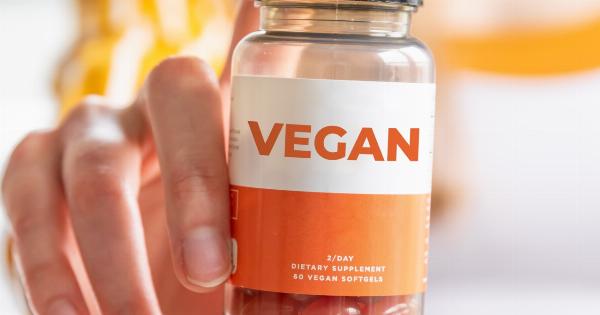A vegetarian diet is known for its numerous health benefits, including lower risks of heart disease, obesity, and certain types of cancer.
However, due to the exclusion of animal products, vegetarians may sometimes face challenges in meeting certain nutrient requirements. While a well-planned vegetarian diet can provide all the necessary nutrients, certain supplements can serve as valuable additions to ensure optimal health and wellbeing.
In this article, we will explore some essential supplements to consider for a vegetarian diet.
Vitamin B12
Vitamin B12 is primarily found in animal-derived products, making it crucial for vegetarians to supplement with this vitamin. It plays a pivotal role in the formation of red blood cells, nerve function, and DNA synthesis.
While plant-based sources such as seaweed and fermented foods may contain some B12, they are unreliable sources, making supplementation necessary. Vitamin B12 supplements are available in the form of tablets, gummies, or even as injections for those with severe deficiencies.
Iron
Iron is an essential mineral that is responsible for oxygen transportation in the body and supports overall energy levels.
While vegetarian sources like legumes, tofu, and leafy greens contain iron, the non-heme iron found in plant foods is not as easily absorbed by the body as heme iron found in animal products. To enhance iron absorption, vegetarians can consider pairing iron-rich foods with vitamin C-rich foods and consuming fermented soy products.
Iron supplements are also available, but it is advisable to consult a healthcare professional before starting any supplementation.
Omega-3 Fatty Acids
Omega-3 fatty acids, specifically EPA and DHA, are vital for brain health, reducing inflammation, and supporting heart health.
While fatty fish is a common source of these nutrients, vegetarians can obtain omega-3s from plant-based sources like flaxseeds, chia seeds, walnuts, and algae-based supplements. Algae-derived omega-3 supplements offer an excellent alternative for those following a vegetarian or vegan diet.
Iodine
Iodine is important for thyroid function, metabolism, and the development of the nervous system. It is commonly found in seafood, making it necessary for vegetarians to find alternative sources.
Vegetarians can include iodized salt in their diet, as well as sea vegetables like nori and kombu. However, if these sources are insufficient, iodine supplements can be considered under the guidance of a healthcare professional.
Vitamin D
Vitamin D plays a crucial role in bone health, immune function, and mental wellbeing.
While sunlight is an excellent natural source of vitamin D, many people, including vegetarians, may require supplementation, especially during winter months or in areas with limited sunlight. Vitamin D2, derived from fungi and plant sources, is readily available in supplement form and is suitable for vegetarians.
Zinc
Zinc is essential for the immune system, cell repair, and growth. Vegetarians may have a higher risk of zinc deficiency as plant-based sources contain compounds that inhibit zinc absorption.
Including zinc-rich foods such as legumes, nuts, seeds, and whole grains can help, but supplementation may be necessary, particularly for those with restricted diets or increased zinc requirements.
Calcium
Calcium is crucial for bone health, muscle function, and nerve transmission.
While dairy products are a common source of calcium, vegetarians can obtain calcium from plant-based sources such as fortified plant milks, tofu, almonds, and leafy greens like broccoli and kale. If calcium requirements are not being met through diet alone, calcium supplements can be considered, ensuring adequate intake of this vital mineral.
Zinc
Zinc is essential for the immune system, cell repair, and growth. Vegetarians may have a higher risk of zinc deficiency as plant-based sources contain compounds that inhibit zinc absorption.
Including zinc-rich foods such as legumes, nuts, seeds, and whole grains can help, but supplementation may be necessary, particularly for those with restricted diets or increased zinc requirements.
Iron
Iron is an essential mineral that is responsible for oxygen transportation in the body and supports overall energy levels.
While vegetarian sources like legumes, tofu, and leafy greens contain iron, the non-heme iron found in plant foods is not as easily absorbed by the body as heme iron found in animal products. To enhance iron absorption, vegetarians can consider pairing iron-rich foods with vitamin C-rich foods and consuming fermented soy products.
Iron supplements are also available, but it is advisable to consult a healthcare professional before starting any supplementation.
Vitamin B12
Vitamin B12 is primarily found in animal-derived products, making it crucial for vegetarians to supplement with this vitamin. It plays a pivotal role in the formation of red blood cells, nerve function, and DNA synthesis.
While plant-based sources such as seaweed and fermented foods may contain some B12, they are unreliable sources, making supplementation necessary. Vitamin B12 supplements are available in the form of tablets, gummies, or even as injections for those with severe deficiencies.
Vitamin D
Vitamin D plays a crucial role in bone health, immune function, and mental wellbeing.
While sunlight is an excellent natural source of vitamin D, many people, including vegetarians, may require supplementation, especially during winter months or in areas with limited sunlight. Vitamin D2, derived from fungi and plant sources, is readily available in supplement form and is suitable for vegetarians.
Omega-3 Fatty Acids
Omega-3 fatty acids, specifically EPA and DHA, are vital for brain health, reducing inflammation, and supporting heart health.
While fatty fish is a common source of these nutrients, vegetarians can obtain omega-3s from plant-based sources like flaxseeds, chia seeds, walnuts, and algae-based supplements. Algae-derived omega-3 supplements offer an excellent alternative for those following a vegetarian or vegan diet.
Iodine
Iodine is important for thyroid function, metabolism, and the development of the nervous system. It is commonly found in seafood, making it necessary for vegetarians to find alternative sources.
Vegetarians can include iodized salt in their diet, as well as sea vegetables like nori and kombu. However, if these sources are insufficient, iodine supplements can be considered under the guidance of a healthcare professional.
Conclusion
While a vegetarian diet can be highly nutritious and beneficial for overall health, it is important to ensure adequate intake of crucial nutrients.
Supplements such as vitamin B12, iron, omega-3 fatty acids, iodine, vitamin D, zinc, and calcium can help vegetarians bridge any nutritional gaps and maintain optimal wellbeing. However, it is always advisable to consult a healthcare professional or a registered dietitian before starting any supplementation, as their guidance can help determine specific needs for individual vegetarians.






























